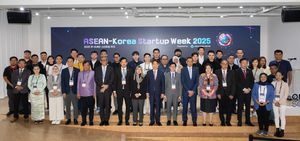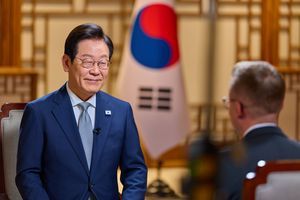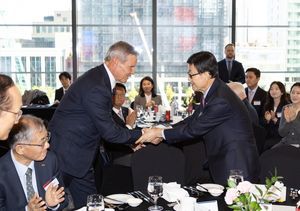![Hector Villarreal, president and managing director of GM Korea, visits the company's Changwon plant on May 15 to encourage employees and oversee on-site operations. (GM Korea)]](https://contents-cdn.viewus.co.kr/image/2025/07/CP-2023-0309/30458808.jpg) An ongoing labor dispute at General Motors Korea, the South Korean unit of General Motors, has escalated as the union secured the legal right to strike following a breakdown in wage negotiations, sources said Monday, fueling concerns that the American auto giant may scale back its production in South Korea amid the threat of US auto tariffs.
An ongoing labor dispute at General Motors Korea, the South Korean unit of General Motors, has escalated as the union secured the legal right to strike following a breakdown in wage negotiations, sources said Monday, fueling concerns that the American auto giant may scale back its production in South Korea amid the threat of US auto tariffs.
The suspension legally allows the union to begin collective action, intensifying a standoff already marked by widespread worker opposition to the company’s plan to sell General Motors’s South Korean service centers nationwide and unutilized facilities at its Bupyeong plant in Incheon, west of Seoul.
The union has demanded the withdrawal of the asset sale plan as a precondition for wage negotiations.
In a vote last month, 88.2 percent of General Motors Korea’s 6,851 union members supported a strike, marking the highest approval rate in the union’s history.
This dispute unfolds amid growing concerns that General Motors might scale back or eliminate its South Korean manufacturing operations if the United States maintains its 25 percent tariffs on auto imports, a key policy pledge of President Donald Trump during his reelection campaign.
General Motors Korea exports approximately 410,000 vehicles annually, with about 85 percent of those shipments destined for the US market.
On the wage front, the union is demanding a monthly base salary increase of 141,300 KRW ($106) and a performance-based bonus of 41.36 million KRW ($31,020) per worker.
In contrast, General Motors Korea’s management has defended its restructuring plan, informing employees of its intention to gradually sell the company’s service centers and dispose of underutilized facilities.
The company maintains that customer support will continue through its network of 386 partner service centers across the country and that employees at the affected sites will retain their jobs.
A union spokesperson stated that unless the company withdraws its sale plans, labor will consider escalating its actions, adding, “We are keeping all options on the table.” (Yonhap)










Most Commented